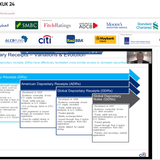At the beginning of the year the Kuczynski government presented a new law that regulates PPPs, which have played a crucial role in the country’s infrastructure development, changing the way Peru’s construction companies do business with the state.
In 2017, the Peruvian government is supposed to award up to US$14bn worth of projects to PPPs, while in 2018 that figure is set to decline slightly to around US$10bn, according to the Minister of Finance Alfredo Thorne.
However, before the government restarts the next wave of infrastructure investment – which has stalled since investigations into Brazilian construction giant Odebrecht, a big player in the region, began – it is trying to make public offerings and contracts more efficient and transparent by enacting a series of new rules that regulate PPPs.
Among the relevant changes, they are forcing companies to sign a new “anti- corruption” clause that will prevent companies found to have participated in any illegal dealings from receiving compensation for the termination of their contracts.
“When the contract is terminated under the application of the anti-corruption clause specified in the contract the investors have no right to claim any sort of compensation,” the new guidelines set out.
Farewell to Banking Amendments
The most controversial change in the new guidelines is the virtual elimination of the so-called “banking amendments.” Previously, a contractor could claim amendments to a contract after it was signed. This allowed contractors to claim more money back, or ask the government to intervene if they could not find necessary funding.
This change has been highly praised by local observers, particularly against the backdrop of recent scandals and delays involving PPPs.
In the past, it has often been the case that constructions companies would bid for government contracts citing very low prices, only to jack them up at a later date, or bid for a contract without much certainty they could fully finance the endeavour.
Now, companies participating with PPPs will need to demonstrate to the government that they have secured the necessary funding from lenders. This is part of the government’s bid to place more of the financial risk associated with PPPs onto the private sector.
“The government wants to prevent companies from abusing this amendment by forcing them to obtain their funding before the process actually begins,” explained Alfonso Segura, Peru’s former Minister of Economics.
The government is also trying to ensure that private companies and investors take on a greater portion of the construction risk.
Previously, the government would start paying a contractor while the project was being constructed through a voucher system; now, the government is mulling whether or not to move to a system whereby they would only pay upon completion of the construction phase.
While the proposal has received praise from some, others believe it might not be viable.
“This model might work well with smaller projects, but they will find it very hard to build a Metro Line like this.”
Large market players – including local banks operating in Peru – have previously voiced their concerns with this model, as they do not feel comfortable lending money to companies with so few guarantees in the event something were to go wrong. It raises new questions around sources of funding for construction firms, which have long championed the country’s voucher-based system that saw government assume significant project risk on behalf of private sector counterparties.
“The way this new framework is going work remains to be seen, all the player will have to come to some arrangement, but I believe it is a step in the right direction,” Segura concluded.
So far, the government’s message to the private sector remains clear: embrace transparency and discipline when it comes to doing business with the state or face the repercussions. But, implementing these much-needed reforms without hampering the sector’s growth and further delaying the work that Peru so badly needs will be easier said than done. If the government forces private sector companies to assume nearly all of the project risk, it will put a damper on the supply of long-term money – which is already slimming due to regulatory pressures on bank balance sheets. A balance will have to be struck in order for further delays to be avoided.









